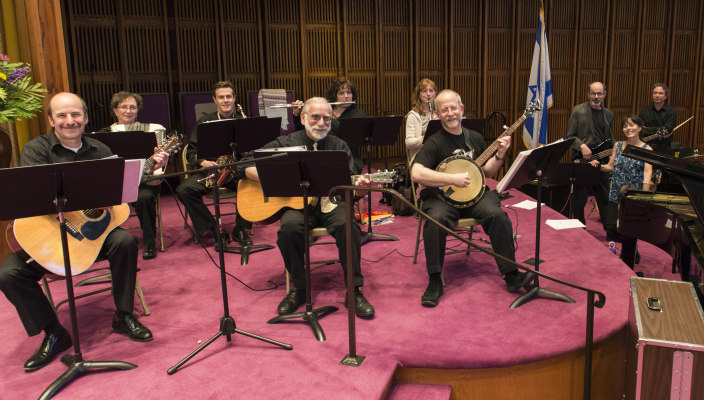
In 2016, when the Union for Reform Judaism (URJ) launched a Community of Practice (CoP) focused on engaging baby boomers in synagogue life, it was a trailblazer. Very few Jewish organizations – especially major North American organizations – had previously recognized the need to better understand and involve boomers in Jewish life – and even fewer had invested major time or resources to engage the largest adult cohort in the Jewish community.
During the 18-month journey, our CoP engaged 11 URJ congregations from across North America in exploration, experimentation, and collaboration. We gathered in person to hear from experts and pacesetters about boomer engagement and together, we explored how to lead congregational change with the intent of involving boomers in meaningful and new ways. We particularly sought to answer two fundamental questions: 1) How do we determine what our boomer population needs from congregations today? 2) What assumptions must we give up when we think about boomers?
When our CoP ended, we shared some of what we’d learned at a symposium following the 2017 URJ Biennial. We have continued to explore the lessons inherent in this important work and offer these four insights to keep in mind when engaging baby boomers.
1. There are importance differences among baby boomers.
By definition, baby boomers are the cohort of Americans born between 1946 and 1964. They tend to be well educated, financially secure, and, within the Jewish community, more socially integrated than the previous generation of Jews.
Many baby boomers face a 20-year period between midlife careers and childrearing, on one hand, and retirement on the other. During this time, their needs, attitudes, and life trajectory can change greatly. One minute a healthy married couple travels the world and the next illness or economic challenges set in and life takes an unexpected turn.
To engage boomers effectively in your community, you need to be prepared for possible eventualities to respond to boomers’ emerging needs. As is true when engaging other cohorts is also true for boomers: one size does not fit all.
2. Baby boomers do not necessarily remain synagogue members.
In the past, there was hope that boomers would remain synagogue members because of loyalty to the institution, but this is no longer the case. Boomers leave congregations – after their children’s b’nei mitzvah or once the “nest” is empty – believing there is nothing left there for them.
Like other groups, they indulge in episodic engagement, going wherever their interests (and social media) take them, staying as long as they’re interested, and then moving on. At the same time, we know they hope for stronger connections to a congregational community and to their clergy. If they connect on a personal level, the likelihood they’ll stay (and attend) rises.
In this new stage of life, boomers will go wherever new opportunities and appealing spiritual insights turn up. To maximize the chance boomers will come to or stay in your community requires a targeted and intentional engagement strategy that replaces anecdotes and assumptions with research and in-depth conversations. Consider running a listening campaign that creates space and mechanisms for boomers to provide feedback and share stories. If you are willing to drop old generalizations, you might be able to ignite a conversation with boomers that uncovers emerging ideas, goals, and activities, and conveys your commitment to understanding their needs and changing in response.
3. A genuine lay-professional commitment is necessary for meaningful boomer engagement.
Meaningful boomer engagement is possible only when dedicated congregational professionals and strong volunteers offer wholehearted, general support, commit to specific initiatives, and own and manage a clear and well-communicated plan for engaging and expanding the base of baby boomers. Without the devotion of lay and professional partners, unfortunately, plans and their potential often fade.
Although creating new, innovative boomer initiatives might seem challenging, try to leverage what you know about boomers to reframe appropriate programs as boomer initiatives based on their interests and needs.
4. Baby boomers have potential to offer financial support.
People support initiatives that add meaning and value to their lives. Thus, congregations cannot expect boomers to invest in communities in which they don’t have personally meaningful relationships. Conversely, if boomers are engaged, financial support can follow. Creating paths for intergenerational connections among boomer grandparents, their children, and grandchildren will enliven participation. Other dimensions of boomers’ lives also offer opportunities for deeper and more relevant engagement, including for single, divorced, and widowed members, and around shared interests such as health support, lifelong learning, and travel. Meaningful engagement leads to investment – of time, passion, and funds.
To succeed in once again engaging boomers in Jewish life, it is essential to possess the energy to embark on a genuine, thoughtful initiative – and a commitment to see it through to fruition.
Julie Lambert, RJE, is the Union for Reform Judaism’s associate director of congregational innovation. Stuart Himmelfarb is the CEO of the B3/The Jewish Boomer Platform and a senior fellow at New York University’s Wagner School of Public Service.
Have something to say about this post? Join the conversation in The Tent, the social network for congregational leaders of the Reform Movement. You can also tweet us or tell us how you feel on Facebook.
Related Posts

Setting Your Leaders Up For Success

Safety, Equity, and Accountability is the Path to a Thriving Jewish Community
